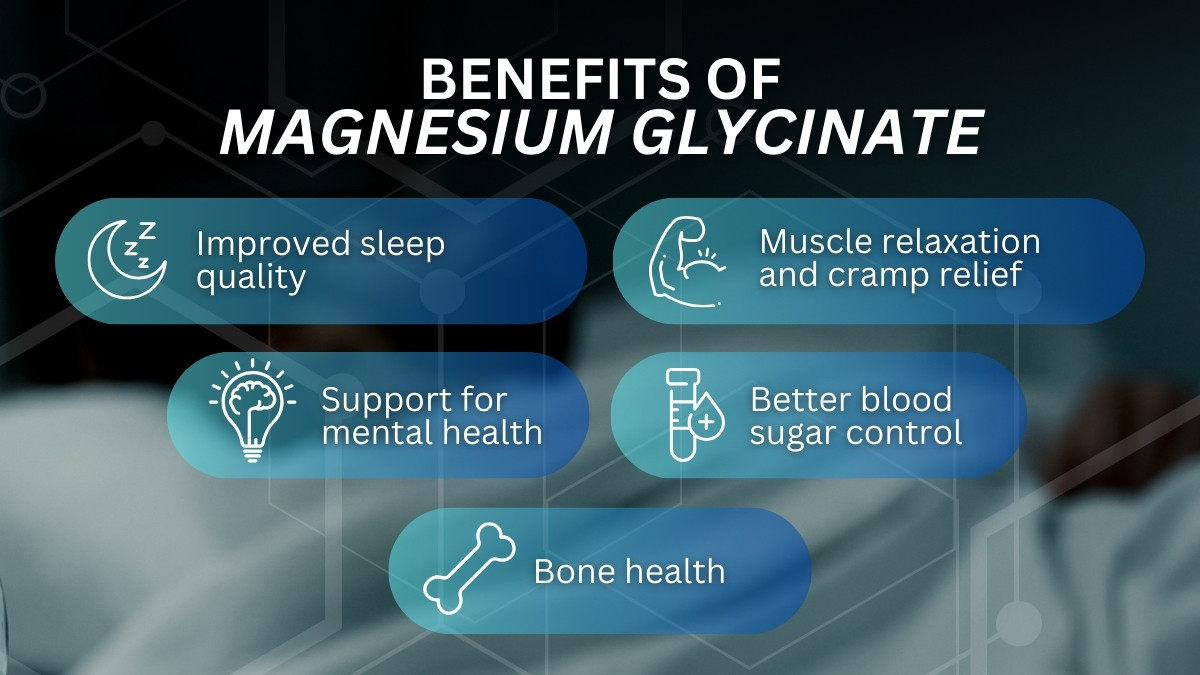Magnesium is an essential mineral that plays a vital role in many bodily functions, including muscle and nerve function, blood sugar regulation, and bone health.
Despite its importance, many people do not get enough magnesium from their diets alone.
This is where supplements like magnesium glycinate can be helpful.
Magnesium glycinate is a highly bioavailable form of magnesium that is easily absorbed by the body and has several potential health benefits.
In this post, we'll explore the benefits of magnesium glycinate and why it may be a valuable addition to your overall health and wellness plan.
Let's dive in!
Magnesium glycinate is a form of magnesium that is highly bioavailable, meaning the body can easily absorb and utilize it.
It is made by combining the essential mineral magnesium with the amino acid glycine.
Magnesium is an important nutrient that plays a role in many bodily processes, including nerve function, muscle contraction, and bone health.
Glycine is known for its calming effects and can help promote quality sleep.
Together, magnesium glycinate can offer numerous health benefits, 5 of which we will be exploring below.

Magnesium plays a pivotal role in numerous physiological processes, including the regulation of neurotransmitters that govern mood and stress responses.
When paired with glycine, an amino acid known for its calming properties, the compound may enhance the brain's production of gamma-aminobutyric acid (GABA), a neurotransmitter that inhibits the activity of nerve cells and promotes relaxation.
By supporting neural function and promoting GABA production, magnesium glycinate can act as a natural relaxant, potentially offering relief to those grappling with stress and anxiety.
Magnesium is integral to various bodily functions, including the regulation of the body's internal clock and sleep-wake cycles.
In combination of glycine, magnesium may further promote relaxation by enhancing the production of GABA.
As a result, magnesium glycinate can help in quieting the mind and body, making it easier to fall asleep and ensuring a deeper, more restorative sleep.
For individuals struggling with sleep disturbances or insomnia, supplementing with magnesium glycinate might offer a natural approach to achieving better sleep quality.
Deficiencies in magnesium have been linked to a range of mental health issues, including depression, anxiety, and mood disorders.
By ensuring optimal magnesium levels through the highly absorbable form of magnesium glycinate, one might support the brain's neurochemical balance, thereby fostering resilience against stressors and potentially mitigating symptoms of certain mental health conditions.
The combined neuroprotective and regulatory effects of both magnesium and glycine underscore the potential of magnesium glycinate as a valuable ally in mental health maintenance.
One study found that taking 125-300 mg of magnesium glycinate daily for three months led to significant improvements in working and long-term memory in participants with a history of migraines.
Magnesium glycinate's ability to promote relaxation and reduce stress may also indirectly contribute to better memory recall as stress is a known factor that can impair memory.
Magnesium is essential for bone health, and magnesium glycinate has been found to be particularly effective in improving bone density and reducing the risk of osteoporosis.